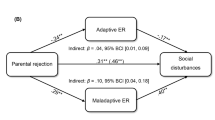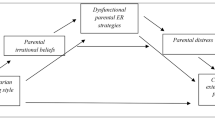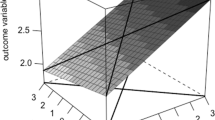Abstract
Objectives
Research has shown a link between parental and offspring internalizing problems and that parental warmth and overprotection affect these relationships. However, less research has examined how parental warmth and overprotection affect the link between parental internalizing problems and irritability in adolescents. Thus, the current study investigated the moderating effect of parental warmth and overprotection on the relationship between parental internalizing problems and adolescent irritability in the context of parent and child gender.
Methods
Participants were parents of adolescents aged 10–24 years and completed surveys online about themselves, the adolescent, and the adolescent’s other primary caregiver. Questionnaires assessed parental warmth and overprotection, parental internalizing problems, and adolescent irritability.
Results
Results indicated a moderating effect of parental warmth (b = −0.08, p< 0.01) and overprotection (b = 0.21, p< 0.01) on the relationship between parental internalizing problems and adolescent irritability. Parent and child gender further moderated the relationship when examining parental overprotection (b = −0.16, p< 0.01) but not parental warmth.
Conclusions
Results highlight the importance of examining factors, such as parental internalizing problems, warmth, and overprotection, that influence the development of irritability symptoms in adolescents. Additionally, results highlight the importance of examining how gender moderates these relationships. For example, the effect of maternal overprotection on male adolescents was particularly important, which suggests that more research should be done to further understand the complex nature of this relationship.




Similar content being viewed by others
References
Achenbach, T. M., & Rescorla, L. A. (2003). Manual for the ASEBA adult forms & profiles. Burlington, VT: University of Vermont, Research Center for Children, Youth, & Families.
Affrunti, N. W., & Woodruff-Borden, J. (2015). Parental perfectionism and overcontrol: examining mechanisms in the development of child anxiety. Journal of Abnormal Child Psychology, 43, 517–529.
Antúnez, Z., de la Osa, N., Granero, R., & Ezpeleta, L. (2016). Parental psychopathology levels as a moderator of temperament and oppositional defiant disorder symptoms in preschoolers. Journal of Child and Family Studies, 25, 3124–3135.
Arnett, J. J. (2000). Emerging adulthood: a theory of development from the late teens through the twenties. American Psychologist, 55, 469–480.
Bennett, D. A. (2001). How can I deal with missing data in my study? Australian and New Zealand Journal of Public Health, 25, 464–469.
Borelli, J. L., Margolin, G., & Rasmussen, H. F. (2015). Parental overcontrol as a mechanism explaining the longitudinal association between parent and child anxiety. Journal of Child and Family Studies, 24, 1559–1574.
Collishaw, S., Maughan, B., Natarajan, L., & Pickles, A. (2010). Trends in adolescent emotional problems in England: a comparison of two national cohorts twenty years apart. Journal of Child Psychology and Psychiatry, 51, 885–894.
Chen, F., & Luster, T. (1999). Factors related to parenting behavior in a sample of adolescent mothers with two-year-old children. Early Child Development and Care, 153, 103–119.
Dougherty, L. R., Smith, V. C., Bufferd, S. J., Stringaris, A., Leibenluft, E., Carlson, G. A., & Klein, D. N. (2013). Preschool irritability: longitudinal associations with psychiatric disorders at age 6 and parental psychopathology. Journal of the American Academy of Child & Adolescent Psychiatry, 52, 1304–1313.
Drake, K. L., & Ginsburg, G. S. (2011). Parenting practices of anxious and nonanxious mothers: a multi-method, multi-informant approach. Child & Family Behavior Therapy, 33, 299–321.
Endendijk, J. J., Groeneveld, M. G., & Mesman, J. (2018). The gendered family process model: an integrative framework of gender in the family. Archives of Sexual Behavior, 47, 877–904.
Epkins, C. C., & Harper, S. L. (2016). Mothers’ and fathers’ parental warmth, hostility/rejection/neglect, and behavioral control: specific and unique relations with parents’ depression versus anxiety symptoms. Parenting: Science and Practice, 16, 125–142.
Eyre, O., Langley, K., Stringaris, A., Leibenluft, E., Collinshaw, S., & Thapar, A. (2017). Irritability in ADHD: associations with depression liability. Journal of Affective Disorders, 215, 281–287.
Finley, G. E., Mira, S. D., & Schwartz, S. J. (2008). Perceived paternal and maternal involvement: factor structures, mean differences, and parental roles. Fathering: A Journal of Theory, Research, and Practice about Men as Fathers, 6, 62–82.
Franz, A. O., & McKinney, C. (2018). Parental and child psychopathology: moderated mediation by gender and parent-child relationship quality. Child Psychiatry & Human Development, 49, 843–852.
Ginicola, M. M. (2007). Children’s unique experience of depression: using a developmental approach to predict variation in symptomatology. Child and Adolescent Psychiatry and Mental Health, 1, 9.
Goldner, J. S., Quimby, D., Richards, M. H., Zakaryan, A., Miller, S., Dickson, D., & Chilson, J. (2016). Relations of parenting to adolescent externalizing and internalizing distress moderated by perception of neighborhood danger. Journal of Clinical Child and Adolescent Psychology, 45, 141–154.
Inguglia, C., Ingoglia, S., Liga, F., Lo Coco, A., Lo Cricchio, M. G., Musso, P., & Lim, H. J. (2016). Parenting dimensions and internalizing difficulties in Italian and U.S. emerging adults: the intervening role of autonomy and relatedness. Journal of Child and Family Studies, 25, 419–431.
Kashdan, T. B., Jacob, R. G., Pelham, W. E., Lang, A. R., Hoza, B., Blumenthal, J. D., & Gnagy, E. M. (2004). Depression and anxiety in parents of children with ADHD and varying levels of oppositional defiant behaviors: modeling relationships with family functioning. Journal of Clinical Child and Adolescent Psychology, 33, 169–181.
Klann, E. M., Wong, Y. J., & Rydell, R. J. (2018). Firm father figures: a moderated mediation model of perceived authoritarianism and the intergenerational transmission of gender messages from fathers to sons. Journal of Counseling Psychology, 65, 500–511.
Li, I., Clark, D. A., Klump, K. L., & Burt, S. A. (2017). Parental involvement as an etiological moderator of middle childhood oppositional defiant disorder. Journal of Family Psychology, 31, 659–667.
Low, N. C., Dugas, E., Constantin, E., Karp, I., Rodriguez, D., & O’Loughlin, J. (2012). The association between parental history of diagnosed mood/anxiety disorders and psychiatric symptoms and disorders in young adult offspring. BMC Psychiatry, 12, 188.
McKinney, C., Brown, K., & Malkin, M. L. (2017). Parenting style, discipline, and parental psychopathology: gender dyadic interactions in emerging adults. Journal of Child and Family Studies, 27, 290–301.
McKinney, C., & Franz, A. O. (2018). Latent profiles of perceived parental psychopathology: Associations with emerging adult psychological problems. Child Psychiatry and Human Development, 50, 411–424.
McKinney, C., & Kwan, J. W. (2018). Emerging adult perceptions of and preferences for parenting styles and associated psychological outcomes. Journal of Family Issues, 39, 2491–2504.
Moilanen, K. L., Shaw, D. S., & Fitzpatrick, A. (2010). Self-regulation in early adolescence: relations with mother–son relationship quality and maternal regulatory support and antagonism. Journal of Youth and Adolescence, 39, 1357–1367.
Nelson, L. J., Padilla-Walker, L. M., Christensen, K. J., Evans, C. A., & Carroll, J. S. (2011). Parenting in emerging adulthood: an examination of parenting clusters and correlates. Journal of Youth and Adolescence, 40, 730–743.
Pargas, R. C. M., Brennan, P. A., Hammen, C., & Le Brocque, R. (2010). Resilience to maternal depression in young adulthood. Developmental Psychology, 46, 805–814.
Parker, G., Tupling, H., & Brown, L. (1979). A parental bonding instrument. British Journal of Medical Psychology, 52, 1–10.
Prinzie, P., Swillen, A., Maes, B., Onghena, P., Vogels, A., Van Hooste, A., & Fryns, J. (2004). Parenting, family contexts, and personality characteristics in youngsters with VCFS. Genetic Counseling, 15, 141–157.
Roberson-Nay, R., Leibenluft, E., Brotman, M. A., Myers, J., Larsson, H., Lichtenstein, P., & Kendler, K. S. (2015). Longitudinal stability of genetic and environmental influences on irritability: from childhood to young adulthood. The American Journal of Psychiatry, 172, 657–664.
Sawyer, S. M., Azzopardi, P. S., Wickremarathne, D., & Patton, G. C. (2018). The age of adolescence. The Lancet Child and Adolescent Health, 2, 223–228.
Schafer, J. L. (1999). Multiple imputation: a primer. Statistical Methods in Medicine, 8, 3–15.
Stevens, E. N., Bardeen, J. R., & Murdock, K. W. (2015). Parenting behaviors and anxiety in young adults: effortful control as a protective factor. Journal of Individual Differences, 36, 170–176.
Strickland, J. C., & Stoops, W. W. (2018). The use of crowdsourcing in addiction science research: Amazon Mechanical Turk. Experimental and Clinical Psychopharmacology, 27, 1–18.
Trepat, E., Granero, R., & Ezpeleta, L. (2014). Parenting practices as mediating variables between parents’ psychopathology and oppositional defiant disorder in preschoolers. Psicothema, 26, 497–504.
Walker, C. S., & McKinney, C. (2015). Parental and emerging adult psychopathology: moderated mediation by gender and affect toward parents. Journal of Adolescence, 44, 158–167.
Whelan, Y. M., Leibenluft, E., Stringaris, A., & Barker, E. D. (2015). Pathways from maternal depressive symptoms to adolescent depressive symptoms: the unique contribution of irritability symptoms. Journal of Child Psychology and Psychiatry, 56, 1092–1100.
Wiggins, J. L., Mitchell, C., Stringaris, A., & Leibenluft, E. (2014). Developmental trajectories of irritability and bidirectional associations with maternal depression. Journal of the American Academy of Child & Adolescent Psychiatry, 53, 1191–1205.
Funding
The current study was funded by the Mississippi State University Shackhouls Honors College.
Author Contributions
C.M. conceived of and designed the study, assisted with the literature review, conducted analyses, and revised and edited the manuscript. E.H.S. helped secure funding for the study, contributed to the conception and design of the study, assisted with making the study available to participants, and provided feedback on and edited the manuscript. A.S. secured funding for the study, made the study available to participants, assisted with analyses, and completed an initial draft of the manuscript.
Author information
Authors and Affiliations
Corresponding author
Ethics declarations
Conflict of Interest
The authors declare that they have no conflict of interest.
Ethics Statement
All participants were treated according to APA ethical standards. IRB approval was received from Mississippi State University.
Informed Consent
Informed consent was received from every participant in the study in accordance with APA ethical standards.
Additional information
Publisher’s note: Springer Nature remains neutral with regard to jurisdictional claims in published maps and institutional affiliations.
Rights and permissions
About this article
Cite this article
McKinney, C., Steele, E.H. & Story, A. Effects of Parental Internalizing Problems on Irritability in Adolescents: Moderation by Parental Warmth and Overprotection. J Child Fam Stud 28, 2791–2799 (2019). https://doi.org/10.1007/s10826-019-01459-9
Published:
Issue Date:
DOI: https://doi.org/10.1007/s10826-019-01459-9




